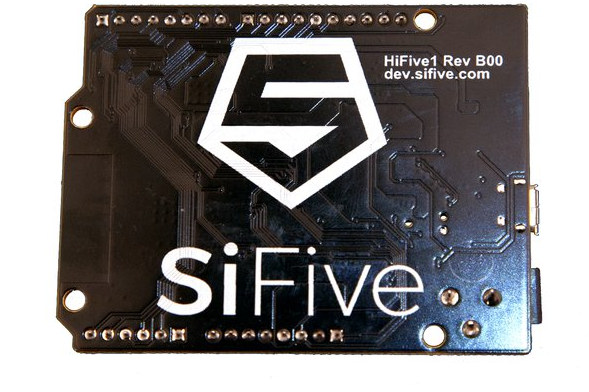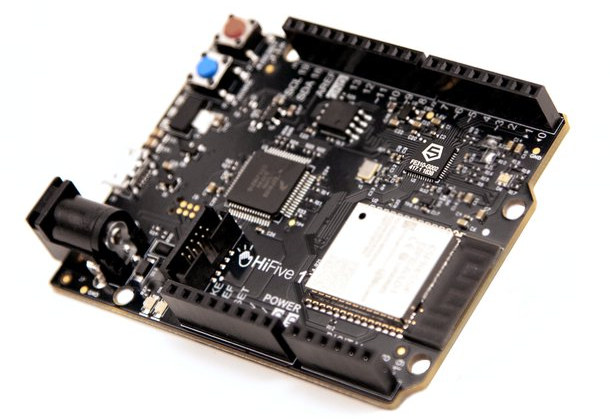SiFive launched what may have been the very first RISC-V development board in 2016 thanks to their HiFive1 Arduino compatible board powered by Freedom E310 (FE310) open source RISC-V processor.
The company has now launched an upgrade version of the processor and board. Meet FE310-G002 processor and HiFive1 Rev B development board.
HiFive1 Rev B development board specifications with new features highlighted in bold or stricken-through:
- MCU – SiFive Freedom E310-G0002 32-bit RV32IMAC processor @ up to 320+ MHz (1.61 DMIPS/MHz)
- Storage – 32 Mbit SPI flash (was 128 Mbit in the first version)
- Connectivity – ESP32-SOLO-1 WiFi & Bluetooth module
- I/Os
- 19x Digital I/O Pins
- 19x external interrupt pins
- 1x external wakeup pin
- 9x PWM pins
- 1/3 SPI Controllers/HW CS Pins
- I/O Voltages – 3.3V
or 5Vsupported; note: bidirectional level shifters removed so FE310-G002 can drive the I/O pins directly at 3.3V only.
- USB – 1x micro USB port for power, programming and debugging (via Segger J-Link)
- Power Supply – 5 V via USB or 7 to 12V via DC Jack; Operating Voltage: 3.3 V and 1.8 V
- Dimensions – 68 mm x 51 mm
- Weight – 22 grams
 The addition of Segger J-Link enables USB drag-and-drop flash programming as the board shows up as a mass storage device when plugged into a PC. The reason why they decreased the capacity of the NOR flash is simply because 128Mbit of storage was overkill on that platform.
The addition of Segger J-Link enables USB drag-and-drop flash programming as the board shows up as a mass storage device when plugged into a PC. The reason why they decreased the capacity of the NOR flash is simply because 128Mbit of storage was overkill on that platform.
Changes specific to FE310-G002 processor include:
- 1x hardware I2C
- An additional UART for a total of 2 UARTs
- An upgrade to RISC-V Debug Specification 0.13
- Always-on domain at 3.3V
- The ability to power-off the core power (1.8V) during sleep mode.
If you had no tested HiFive1 board because it was a bit too bleeding edge at the time, the new board may be a good opportunity has the ecosystem around the board has matured with RTOSes, software stacks, toolchains, debuggers, and enclosures now available for the board. The company points out they have enabled Zephyr RTOS to run on FE310 & HiFive1 Rev B board, but it’s unclear whether it’s preloaded on the board. The addition of Bluetooth and WiFi also makes the board suitable to a wider range of projects.
SiFive decided to launch HiFive1 Rev B on Crowdsupply just like for the original board, and lowered the price to $49 with free shipping to the US, and $12 to the rest of the world. This time is more like a pre-order than a crowdfunding campaign, as the funding target is set to a symbolic $1, and the boards are virtually ready since shipping is scheduled for April 16th, or about the time when the campaign ends.

Jean-Luc started CNX Software in 2010 as a part-time endeavor, before quitting his job as a software engineering manager, and starting to write daily news, and reviews full time later in 2011.
Support CNX Software! Donate via cryptocurrencies, become a Patron on Patreon, or purchase goods on Amazon or Aliexpress






I’m afraid that $61 are just too much these days for a hobbyist to spend on a board like this just to play with the risc-v
Jlink is probably the overkill. Without it, the price could have been lowered. Any other cheaper debugging option would have been ideal.
J-Link is a nice to have, if you develop for a company. But I guess everyone owns a J-Link, so that you can save the costs for implementing one. Or just use another cheaper way to flash the device. The price is a bit too high just to play with RISC-V. I already have two RISC-Vs here, but I haven’t played with them. Probably one reason is the lack of support. RIOT OS has the driver included, but not the board, so that I need to do a lot of work by myself.
The board is not meant for the hobbyist. The price point and the Jlink reflected that.
Deleted